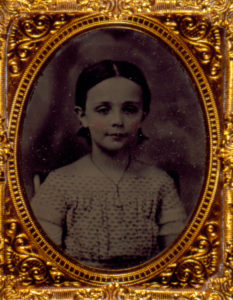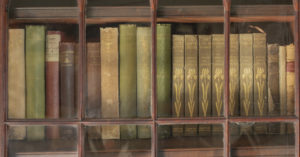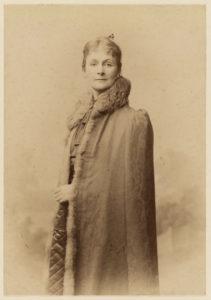 Sarah Orne Jewett House
Sarah Orne Jewett House
Always 9 Years Old

“This is my birthday, and I am always nine years old – not like George Sand, who begins a letter no, no! I mean Madame de Sévigne!! – “5 fevrier 16 —; il y a aujourd’ hui mille ans que je suis née! [It is now eight thousand years since I was born.]” Letter to Sara Norton, September 3, c. 1897
Sarah Orne Jewett wrote this to her friend while in her forties.
Physical descriptions of grown-up Sarah Orne Jewett often included the words “tall,” “beautiful,” “dignified,” even “handsomest woman author in Boston”(Hartford Courant, quoted in The Independent, July 3, 1884, p. 10), and terms to convey her ladylike demeanor.
Descriptions of her character, however, consistently return to the words “simple” and “honest.”
Known for her humor, lack of pretension, and playful nature, Jewett had an affinity for children and for childhood pastimes, and as an adult, she retained a quality of youth.
Jewett wrote to Annie Fields about an incident with her nephew Teddy, whose nickname was Stubby:
“This morning I was out, taking a drive about town with John and I saw such a coast from way up the long hillside down to the tavern garden, and directly afterward down in the village I beheld Stubby faring along with his sled, which is about as large as a postage-stamp. So I borryed it, as you say, and was driven up to the top of the hill street and down I slid over that pound-cake frosting of a coast most splendid, and meekly went back to the village and returned the sled. Then an hour later in bursts Stubby, with shining morning face: ‘There were two fellows that said Aunt Sarah was the boss, she went down side-saddle over the hill just like the rest of the boys!'”
— Letter to Annie Fields, December 4, 1885
Jewett’s fondness for childhood fun belied a driven work ethic and usually effected published works rather than leisure activity.
In an 1893 magazine piece, “Summer Plans of Well-known Authors,” many other writers wrote of travel and seaside retreats. Sarah Orne Jewett’s entry reads: “Miss Sarah Orne Jewett will remain at South Berwick, Me., during the greater part of the summer, and will be busy with work for the magazines.” The Critic 19 (May 1893): 321-323
"A Friendship in Books"

Sarah Orne Jewett wrote a number of stories for young readers: Play Days (1878), a collection of fifteen stories for children; Betty Leicester: A Story for Girls (1890), a longer work, and its sequel, Betty Leicester’s Christmas (1899). Jewett also wrote thirty-one uncollected stories for children between 1870 and 1903, over the course of her entire career.
Of these children’s works, Betty Leicester was quite successful. The wholesomeness of the story was popular with mothers in the late nineteenth and early twentieth centuries.
Jewett received fan mail from young readers about the book, including Miss Mary E. Mulholland, age thirteen, to whom Jewett responded:
“I am sure that you must like a great many other books since you like these stories of mine. And I am so glad, because you will always have the happiness of finding friendships in books, and it grows pleasanter and pleasanter as one grows older. And then the people in books are apt to make us understand ‘real’ people better, and to know why they do things, and so we learn sympathy and patience and enthusiasm for those we live with, and can try to help them in what they are doing, instead of being half suspicious and finding fault.”
-Sarah Orne Jewett, January 23, 1899 (Sarah Orne Jewett, Series A: Correspondence 1879-1908, Folder A48: to Mary E Mulholland. 1899 1 ALS. Boston, MA. 4 p., Special Collections, Colby College, Waterville, Maine)
Friends and Loves of Youth
At the age of eighteen, Sarah Orne Jewett wrote in her diary, “Oh dear, I cannot believe I am grown up. It doesn’t seem as if I was at all. I do believe that if anyone should ask me how old I am and I didn’t think, I should say ten.” (Diary, September 29, 1867)*
Scholars have speculated that some aspect of Jewett’s childlike nature into young adulthood may have been linked to her coinciding aversion to the idea of marriage.
At an age approaching young adulthood, Sarah Orne Jewett did not mention any young as of interest in her diaries and seems to have taken little notice of them. Her writing does reveal, however, a series of intense relationships with young women.
Introduced to Boston society, Sarah found a circle of female friends for whom she developed deep affection, from comradeship with Georgie Halliburton, who became a life-long friend, to infatuations, such as with Cicely Burt, with whom Jewett exchanged rings and whose marriage disappointed Jewett, to Kate diCosta Birckhead, with whom Jewett fell in love.

One close friend, Ellen Mason was a mutual friend of Kate; Ellen and Kate were part of Sarah’s circle who attended sermons by charismatic Episcopal minister Phillips Brooks. During this time, Sarah rigorously sought self-improvement. Kate diCosta Birckhead was to Sarah a spiritual mentor and a profound, perhaps at times overwhelming, love.
For young women of the Victorian era, religion-based outings could be unsupervised social outlets, thus affording Sarah and friends a bit of the freedom she sought.
* MS Am 174326, Item 3, Houghton Library, Harvard University.